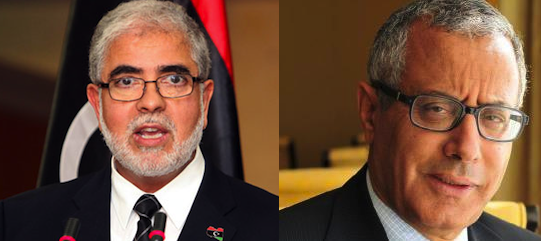By Lorianne Updike Toler.

New York City, 22 October:
The quick change in Libyan prime minister-elect from Mustafa Abushagur to Ali Zidan within . . .[restrict]the past month has many questioning whether the temporary parliamentary structures put in place by the National Transitional Council are sound.
If a problem does exist, however, it is not a function of design error, but the expectation that the General National Congress (GNC) and the new government should operate like other parliamentary systems.
This editorial will investigate those expectations compared to the intended structure of the GNC in suggesting a recalibration of expectations that appropriately considers the role that separation of powers and political parties can and should play in Libya’s existing political structures and in the new Constitution.
In unseating Abushagur through a vote of no confidence after his proposed government was rejected, and in electing Zidan one week later, the GNC operated with complete fidelity to the Constitutional Declaration of 3 August 2011. This, in and of itself, is a triumph for Libyans. It demonstrates to the world commitment to the rule of law and to constitutionalism. (It may, for instance, be positively compared to transitional processes in Egypt, which have been marked by challenges to their interim constitutional documents and procedural irregularities.) Although unsettling to the country’s hopes that a new government will quickly solve pressing security issues, the system functioned exactly as it ought.
Libyans, by design of the 3 August Constitutional Declaration, have determined that parties should play a lesser role in the makeup of the GNC. Only 80 of 200 parliamentary seats were open to election by party ticket in July, the rest being reserved for various independent candidates from Libya’s three regions.
The GNC’s structure was thus rendered fundamentally different from most other parliamentary systems, wherein all seats are determined by party vote. Such structural differences between the GNC and other, more traditional parliamentary structures, produces real differences in the election of prime ministers and the formation of governments.
For example, in traditional parliamentary structures such as in the United Kingdom, winning the most votes in an election produces a majority in Parliament for a given party. This majority is then able to elect a prime minister, who also relies on this majority to approve of his or her government.
In Libya’s 7 July elections, however, the party winning the most seats (39), the National Forces Alliance, captured only 19.5% of the total GNC membership of 200 because of the limitation on party participation. Abushagur, even if he had come from the NFA, would thus have been unable to rely on any kind of majority to approve his government. It is little wonder he did not meet with success.
Rather than become frustrated with recent events or jump to judgment, the country should instead realign expectations: if Libya’s political structure is fundamentally different, then it cannot adopt any other country’s way of doing politics, or expect that political systems will operate in similar fashion.
Instead, Libyan leaders should seek to understand how their unique structure impacts the formation and execution of political functions, the resultant strengths of such a structure, its challenges, and whether and in what ways the system may be improved under a new Constitution.
Deepened understanding may be realised by reviewing two underlying principles at play in recent events, that of the function and role of political parties and regional interests and the division and distribution of powers between branches of government, both historically and in comparative perspective. Follow-on articles within this series will do just that.
Lorianne Updike Toler is the president of Lorianne Updike Toler consulting and the founding president of The Constitutional Sources Project in the United States. [/restrict]




